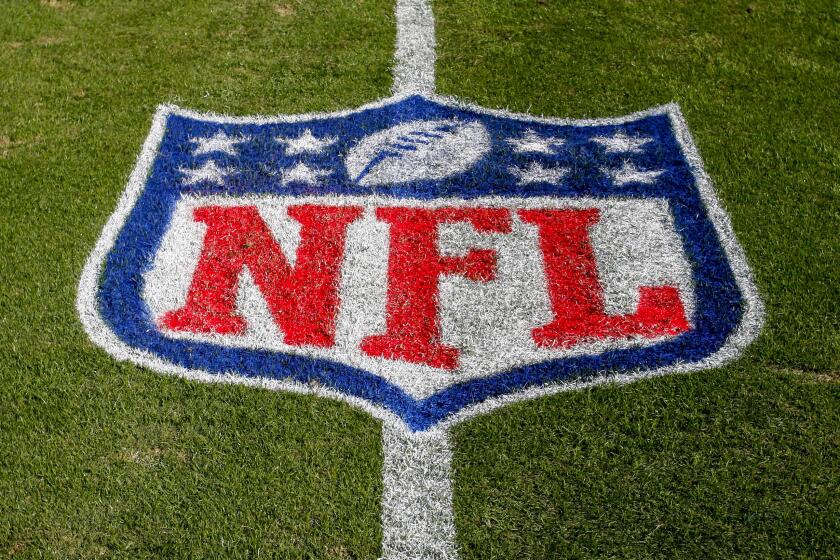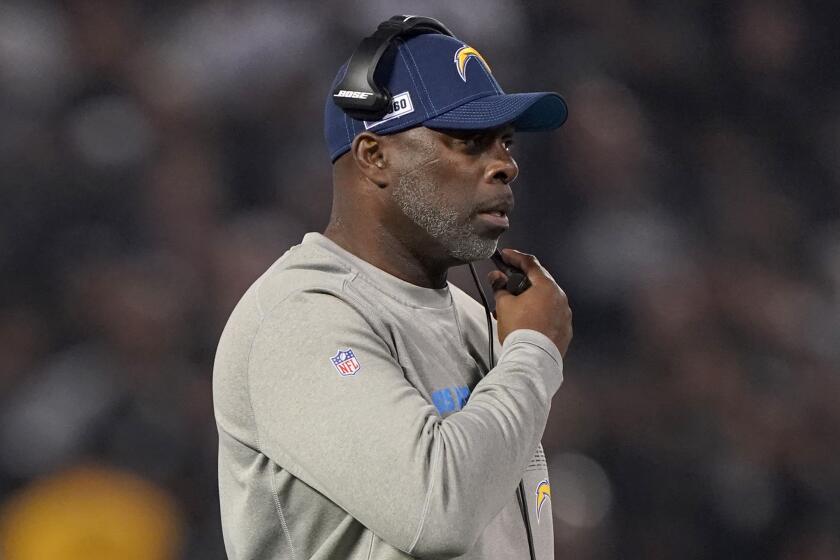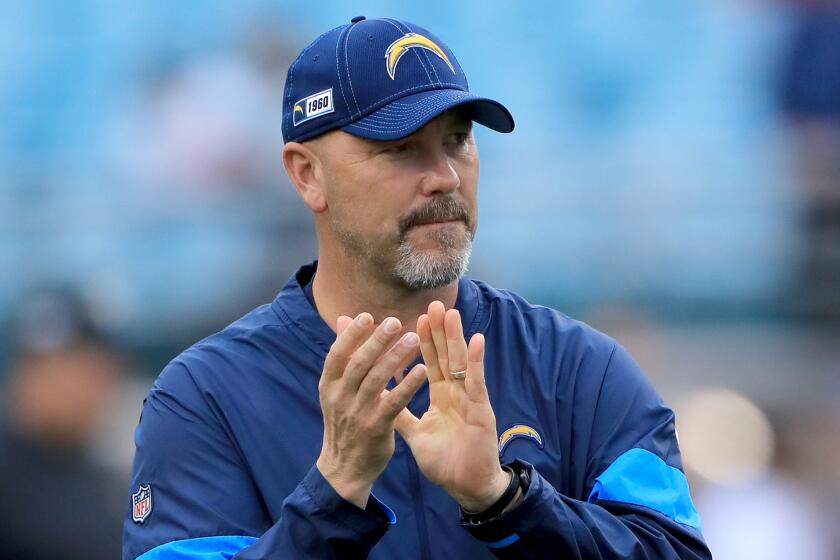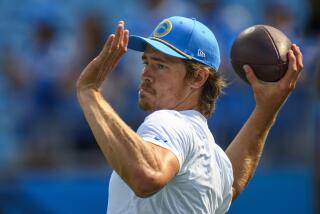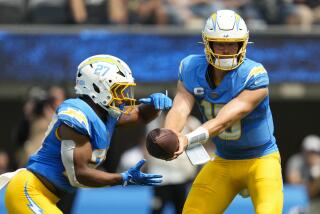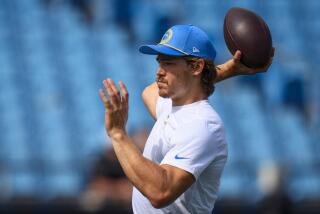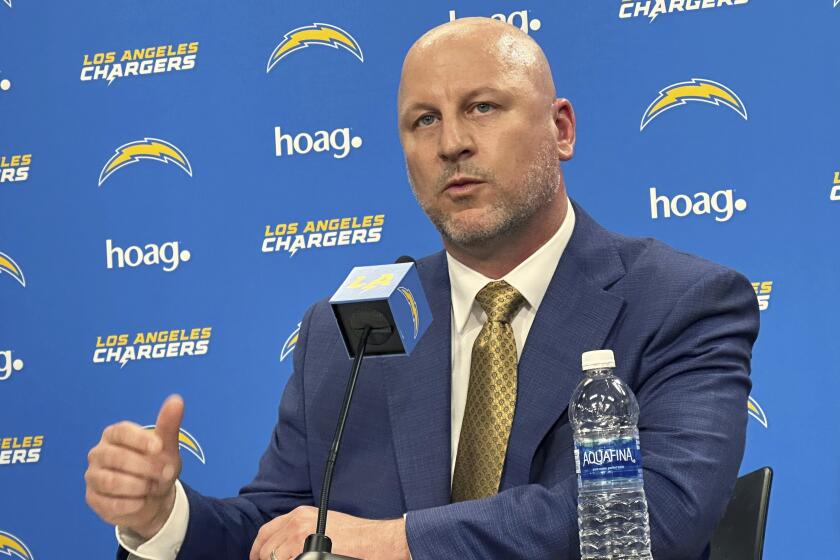Chargers will try to prepare rookie Justin Herbert without live practice
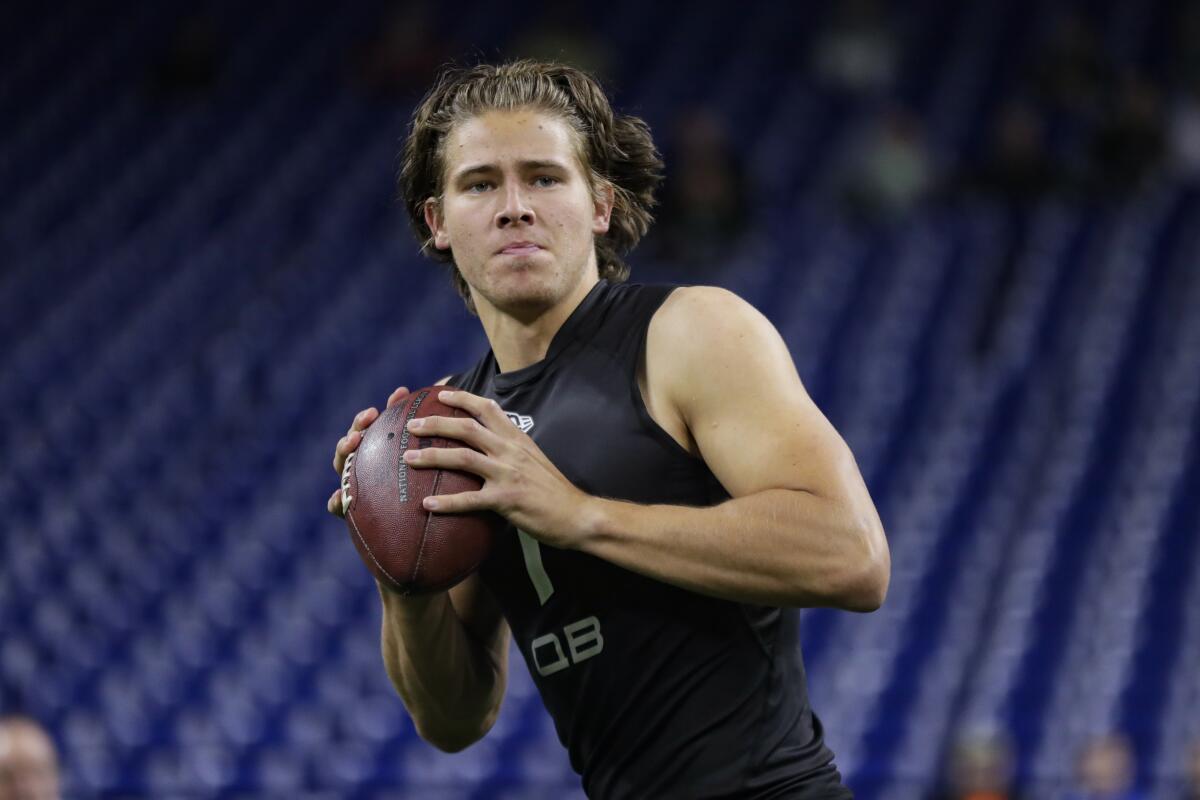
The Chargers haven’t had a Heisman Trophy winner on their roster since Doug Flutie.
Today, however, they do have a recipient of the “Academic Heisman.” The latest recipient of the William V. Campbell Trophy, in fact.
Justin Herbert was honored as college football’s top scholar-athlete in December, a sign — along with the near-perfect grade-point average he achieved at Oregon — that he’ll be able to handle the Xs-and-O’s aspect of being an NFL quarterback.
Problem is, this job isn’t as easy as A-B-C.
“When you get in a game situation, it’s like, ‘Yeah, I know what to do when I see the looks,’ ” Chargers offensive coordinator Shane Steichen said. “But you got two-and-a-half seconds to process 11 guys on defense moving around to make the right decision.
“That’s going to be … when we get him on the grass and we get these guys back in the building, that will be the big thing.”
The NFL is operating under the assumption that the season will be played as scheduled, but COVID-19 has created many challenges for the league.
That will be the huge thing as it relates to Herbert’s development, a complicated enough endeavor under the old normal.
But, with the restrictions of the COVID-19 pandemic, the Chargers are now tasked with bringing along their prized rookie and next potential franchise quarterback virtually, over something as distant as Zoom.
“There’s no way around it,” coach Anthony Lynn said. “Yeah, you’d rather be on the field. But, under the circumstances … we have to try to coach ’em up as best we can. One team’s going to do it better than the other 31, and hopefully that one team’s us.”
As a plus, the Chargers don’t need Herbert to play right away. They plan to enter the season with Tyrod Taylor as their starter and, if things go ideally, stick with the veteran en route to securing a winning season and playoff berth.
But eventually, if he’s going to blossom into everything expected of a No. 6 overall draft pick, Herbert will need a solid foundation, one that must be laid during very uncertain times.
Chargers open NFL season on road against Cincinnati Bengals and then make SoFi Stadium debut in Week 2 against defending Super Bowl champion Kansas City Chiefs.
“Reading it and doing it is always different,” the rookie said. “That’s one of the things that’s tough about this situation. But we don’t have any control over it. We have to do what’s best.
“I’ve always taken pride in preparing, whether it’s school work or in the film room … I know I’m going to do my best to pick up as much as I can. When that time comes that we go out on the field, I know that I’ll be ready.”
On Friday, the Chargers began their rookie mini-camp, an annual exercise designed to start teaching the new players about how life in the NFL works.
As with everything these days, the gathering is happening remotely, depriving Herbert and the rest of the rookie class of the precious snaps that could have been available because the veterans aren’t present.
“You’re taking all the reps as a starter, especially if you’re an early pick,” safety Derwin James said. “Just getting those reps and being in the classroom with the coaches [is important].”
Entering his third season, James recalled how much that experience affected his rookie season that began in the first round and ended in the Pro Bowl.
And that’s not the only thing.
“Doing the [work] with the strength and conditioning coach,” James said. “I feel like that helped me a lot getting my body in NFL form. All that helped give me a little head start on my rookie year.”
To appreciate the utter significance of snaps — even those that don’t officially count — consider that Chargers defensive coordinator Gus Bradley this week lamented not playing veteran Thomas Davis leading up to the 2019 opener.
Bradley said the team might have done the linebacker “a disservice” by not using him in any of the four preseason games as he was trying to learn a new system. The result, Bradley noted, was a slow start for Davis in the regular season.
And this wasn’t a rookie struggling to catch up but a veteran of 14 NFL seasons, with multiple Pro Bowl selections and a Super Bowl appearance.
Chargers defensive coordinator Gus Bradley said an emphasis will be placed on pressuring quarterbacks this season, making offenses susceptible to game-changing mistakes.
Last week, Herbert drove from his family’s home in Oregon to Orange County — a journey that took 15 hours thanks to a tractor-trailer accident — to continue training with local quarterback coach and former NFL player John Beck. He said he’s throwing four or five times a week and has been lifting with a few of the other Chargers.
He has talked to tight end Hunter Henry and wide receiver Keenan Allen about getting together to run routes. He and Scott Quessenberry are making plans to work on exchanges from under center, something Herbert didn’t do in college.
“It’ll give me a huge advantage going into training camp, just being familiar with those guys and comfortable with those guys,” Herbert said of throwing to Henry and Allen. “Whatever I can do now will be super beneficial.”
Still, another layer of this challenge remains Herbert’s ability to begin finding his place in this new environment. Organized team activities and early training camp practices are about installing more than just basic schemes.
As the No. 7 overall pick in 2017, wide receiver Mike Williams missed everything through the offseason and training camp. A back injury forced him to remain on the sideline until Week 6 of the regular season.
“As a rookie, OTAs and training camp are when you kind of earn the respect of your teammates,” Williams said. “I missed all that time, all that time when I would have been able to showcase what I could do.”
When he finally made his debut, the Chargers already had suffered a four-game losing streak and were trying to save their season. Williams ended up catching only 11 passes for 95 yards in 10 games.
Chargers new offensive coordinator Shane Steichen, 35, starts with a great toy in quarterback Justin Herbert but also holds the future of the franchise in his hands.
Asked how Herbert could best establish himself, Williams said, “Show it in practice,” an otherwise simple sentiment that is anything but simple today.
As it is, a first-year quarterback known for his ability to move in and out of the pocket already is scrambling, just two weeks after being drafted.
“It’s a whole different deal,” Steichen said of transitioning to the NFL. “The speed of the game, just getting in a huddle, all that stuff. … It will be interesting to see how it all plays out.”
More to Read
Go beyond the scoreboard
Get the latest on L.A.'s teams in the daily Sports Report newsletter.
You may occasionally receive promotional content from the Los Angeles Times.

